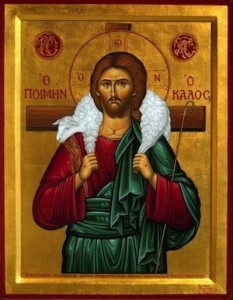Thoughts on Today’s Lessons for Sunday, Sept. 15, 2013.

Jesus and the lost sheep, ancient icon
Two weeks ago, we heard the young prophet Jeremiah imagining an anguished God wondering why God’s chosen people had turned away. Today, a few chapters along, Jeremiah shows us a divine eruption into righteous anger. “My people are foolish … they are stupid children … they have no understanding.” Can you feel the frustrated, angry emotions here, that “I’ve had it” moment that misbehaving children can bring even to the most loving parent? Look out, Jeremiah warns the people at the end: God is angry now, and that has consequences.
First Reading: (Alternative Reading) Exodus 32:7-14
It is surely no coincidence that we have this reading at the time when our Jewish sisters and brothers celebrate Yom Kippur, the Day of Atonement. Rabbinical tradition teaches that Yom Kippur falls on the date when Moses brought the second set of commandments down from the mountain, showing that God granted atonement even for such an idolatrous act as the Israelites’ worship of the golden calf. The lesson is one for the ages: No matter how grave our offenses, when we are truly sorry and we humbly repent, God has mercy on us and forgives us. Every single time.
Psalm: Psalm 14
This Psalm is well chosen to underscore Jeremiah’s vision of God’s patience as being less than infinite just now. Jeremiah’s language of stupidity and foolishness echoes here in scorn for fools, corrupt people and doers of abominable deeds. In contrast with the unrelenting anger of today’s Jeremiah reading, though, the Psalm, at least, ends on a note of hope for those who seek refuge in God.
Psalm: (Alternative Reading) Psalm 51: 1-10
Speaking of sins that seem so awful as to be unpardonable, today’s Psalm recalls the story of King David, who sent his loyal soldier Uriah into harm’s way and certain death in order to cover up David’s adulterous affair with Uriah’s wife, Bathsheba. Then the prophet Nathan accused David, shocking him into recognizing his great sin. The Psalmist, assumed by legend to be David himself, imagines the king’s anguished repentance and hope for God’s forgiveness.
Second Reading: 1 Timothy 1:12-17
The short Pastoral Epistles toward the back of the New Testament, 1 and 2 Timothy and Titus, appear to be letters from Paul offering pastoral advice to two of his associates. Modern bible scholars, though, believe that these letters were actually written by a later Christian leader in Paul’s name, in a time when the early church was becoming institutionalized and cautious. But there’s no debate over today’s reading, which continues this week’s lectionary theme of God’s abundant love and neverending forgiveness.
Gospel: Luke 15:1-10
Stop. Take another look at this familiar parable, but this time see it in a new way: Would a solitary shepherd, alone in the wilderness with predators all around and a flock to care for, really leave 99 sheep unprotected to go out alone into a scary place in search of just one? Well, maybe. Perhaps Jesus would. But perhaps Jesus is spinning a memorable story to make sure that everyone gets the point: God does not just forgive us when we go astray. God actively comes after us, looking for us, bringing us back, every single time.
